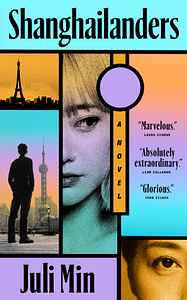Take a photo of a barcode or cover
dark
reflective
tense
slow-paced
Plot or Character Driven:
Character
Strong character development:
No
Loveable characters:
No
Diverse cast of characters:
Yes
Flaws of characters a main focus:
Yes
Shanghailanders had an interesting concept, following a family living in 2040 and slowly working its way back in time as the book moves forward.
I really enjoyed the prose and writing style of Shanghailanders. It was highly engaging and felt authentic to the characters Min was representing. As the family aged, their mannerisms and the way they interacted shifted in a way that feels all too familiar in any family. There also weren’t any characters that I disliked or didn’t want to hear more from.
One thing that threw me off was that, honestly, without context, you wouldn’t even realize half of this book was meant to be set in the future. The futuristic technology and state of the world take a backseat, with the story focusing more on common family dynamics and challenges that a lot of people deal with today, even though this family is incredibly wealthy. But maybe Min did this on purpose to show just how little we change over time?
Even though the backward timeline storyline felt fresh and unique, it did the book a bit of a disservice because it read more like short, fragmented stories rather than a flowing singular novel. Don’t get me wrong, I really enjoyed the stories themselves, but we rarely got closure, and the topics and challenges at each age shifted so dramatically that it felt a little jarring at times.
Despite all that, I still genuinely enjoyed Shanghailanders.
I really enjoyed the prose and writing style of Shanghailanders. It was highly engaging and felt authentic to the characters Min was representing. As the family aged, their mannerisms and the way they interacted shifted in a way that feels all too familiar in any family. There also weren’t any characters that I disliked or didn’t want to hear more from.
One thing that threw me off was that, honestly, without context, you wouldn’t even realize half of this book was meant to be set in the future. The futuristic technology and state of the world take a backseat, with the story focusing more on common family dynamics and challenges that a lot of people deal with today, even though this family is incredibly wealthy. But maybe Min did this on purpose to show just how little we change over time?
Even though the backward timeline storyline felt fresh and unique, it did the book a bit of a disservice because it read more like short, fragmented stories rather than a flowing singular novel. Don’t get me wrong, I really enjoyed the stories themselves, but we rarely got closure, and the topics and challenges at each age shifted so dramatically that it felt a little jarring at times.
Despite all that, I still genuinely enjoyed Shanghailanders.
reflective
sad
slow-paced
Plot or Character Driven:
Character
Loveable characters:
No
Flaws of characters a main focus:
Yes
DNF at 16%. This book had a lot of interesting features - the 2040 start, going backwards - but I was surprised to find that I wasn't really interested in following the characters. None of them intrigued me for some reason - maybe it was that they stood apart too much rather than fitting together in a family story. Obviously I'm sure much changed in the rest of the book, but I try to pause & decide around 10% in whether I'm going to continue with a book, and for this one, there was nothing drawing me back in.
everything about this book just seems Cool.
i thought the traveling-backward-through-time take on a family drama might feel gimmicky, but it actually felt so fresh and interesting. sure, 2040 didn't feel much different from 2014, but so often with this genre you're finding out the why behind the dynamics after they happen, and this felt like a unique take on that.
i wish this book were a bit longer and we spent more time with each character, but overall this was a great debut!
bottom line: add another point to my "fun kind of unpopular opinion" tracker.
(thanks to the publisher for the arc)
i thought the traveling-backward-through-time take on a family drama might feel gimmicky, but it actually felt so fresh and interesting. sure, 2040 didn't feel much different from 2014, but so often with this genre you're finding out the why behind the dynamics after they happen, and this felt like a unique take on that.
i wish this book were a bit longer and we spent more time with each character, but overall this was a great debut!
bottom line: add another point to my "fun kind of unpopular opinion" tracker.
(thanks to the publisher for the arc)
slow-paced
Plot or Character Driven:
Character
Strong character development:
No
Loveable characters:
No
Diverse cast of characters:
Yes
Unique and captivating, this novel in linked stories follows a family - middle-aged Shanghai man Leo, his artistic Parisian wife Eko, and their three daughters - backward in time, beginning from their barely-touching lives when the daughters are almost grown and ending with Leo and Eko's marriage. The stories are told from a variety of points of view, but all share a wistful and secretive tone that makes the characters' different ambitions and dramas echo one another. The unusual structure means there is no single, central storyline, but the writing is lovely and this is an interesting, thought-provoking book. I was hoping for a more revelatory or explosive ending, however.
4.5 stars.
[I received a complimentary ARC from NetGalley and the publisher. Opinions are my own.]
4.5 stars.
[I received a complimentary ARC from NetGalley and the publisher. Opinions are my own.]
Thank you to NetGalley, the publisher and the author for this eARC.
3.5 stars!
A sparkling debut which shows ample potential from Min to create vivid characters with rich internal and external narratives. This novel possesses a unique plot structure as it follows a family of three daughters from 2040 back to 2018, starting at the advent of their adulthood and ending at the wedding of their parents. By tracking back, the reader is effectively filling in the gaps as to what characters are referencing and why their behaviours, opinions and beliefs led to the first chapters iterations of them. Set against the backdrop of the increasing threat of climate change, and yet simultaneously the boom of technology and property in Shanghai, it casts an intriguing forecast for how our behaviours will alter and yet, perhaps most striking, is how slow the threat encroaches and how naturally the characters seem to adapt to its threats.
Ambitious in construction, at times, the novel almost reads best as a collection of short stories built around the same characters as, in moving back, one never finds out what happened next. Indeed, the entire book is preoccupied with discovering how the past informs the present and the future rather than providing clarity or resolution to the opening chapters. You see the foundations of the issues raised in 2040, you grow to empathise more with the behaviours shown, and yet the conclusion is never reached because we only move backwards.
While there are fun threads to pull on, for example why the youngest daughter resents the middle sister for 'Lucy', there are some narratives which feel unnecessary to the family's arc. Indeed, I thoroughly enjoyed the examination of the lives of the family's live-in nanny, and a train worker who was once married to Leo, the patriarch's less successful friend and colleague, and they were a powerful mediation on the class and financial structures in Shanghai, however, they did not feel fully necessary to the overarching narrative of the book.
The most intriguing part of this novel was that of the family dynamics and the individual personalities. The repeated hints at marital discord that spiral out and out as you travel further back in time, and the complex sisterly relationships, were fascinating, however, as you are travelling back in time, while you do get to see some of their formation, many questions are left unanswered or only vaguely hinted at. With that said, this book is incredibly ambitious, both far reaching in its scope and yet incredibly intimate in its exploration of a specific family, and, while I think sometimes it lacks in pay-off, the rich depictions of this family, and the engaging exploration of class, family, and how our pasts inform our present are well worth a read.
3.5 stars!
A sparkling debut which shows ample potential from Min to create vivid characters with rich internal and external narratives. This novel possesses a unique plot structure as it follows a family of three daughters from 2040 back to 2018, starting at the advent of their adulthood and ending at the wedding of their parents. By tracking back, the reader is effectively filling in the gaps as to what characters are referencing and why their behaviours, opinions and beliefs led to the first chapters iterations of them. Set against the backdrop of the increasing threat of climate change, and yet simultaneously the boom of technology and property in Shanghai, it casts an intriguing forecast for how our behaviours will alter and yet, perhaps most striking, is how slow the threat encroaches and how naturally the characters seem to adapt to its threats.
Ambitious in construction, at times, the novel almost reads best as a collection of short stories built around the same characters as, in moving back, one never finds out what happened next. Indeed, the entire book is preoccupied with discovering how the past informs the present and the future rather than providing clarity or resolution to the opening chapters. You see the foundations of the issues raised in 2040, you grow to empathise more with the behaviours shown, and yet the conclusion is never reached because we only move backwards.
While there are fun threads to pull on, for example why the youngest daughter resents the middle sister for 'Lucy', there are some narratives which feel unnecessary to the family's arc. Indeed, I thoroughly enjoyed the examination of the lives of the family's live-in nanny, and a train worker who was once married to Leo, the patriarch's less successful friend and colleague, and they were a powerful mediation on the class and financial structures in Shanghai, however, they did not feel fully necessary to the overarching narrative of the book.
The most intriguing part of this novel was that of the family dynamics and the individual personalities. The repeated hints at marital discord that spiral out and out as you travel further back in time, and the complex sisterly relationships, were fascinating, however, as you are travelling back in time, while you do get to see some of their formation, many questions are left unanswered or only vaguely hinted at. With that said, this book is incredibly ambitious, both far reaching in its scope and yet incredibly intimate in its exploration of a specific family, and, while I think sometimes it lacks in pay-off, the rich depictions of this family, and the engaging exploration of class, family, and how our pasts inform our present are well worth a read.





